Key takeaways:
- Fear can significantly impact decision-making, relationships, and overall well-being, emphasizing the importance of understanding and managing it effectively.
- Strategies such as establishing a daily routine, maintaining connections with others, and journaling can help navigate fear and foster resilience.
- Practicing mindfulness and relaxation techniques, like meditation and yoga, can ground individuals and improve mental health during stressful times.
- Sharing fears with others can create a sense of camaraderie, transforming isolation into a supportive community that aids in healing and growth.
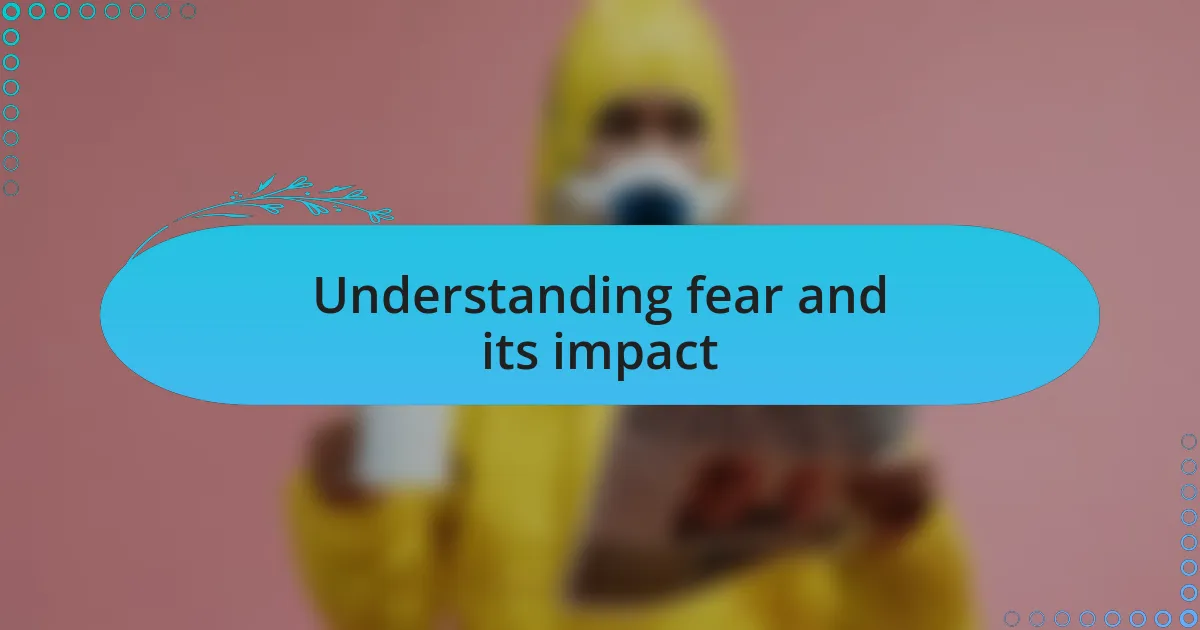
Understanding fear and its impact
Fear is a powerful emotion that can shape our behaviors and decisions, often in ways we don’t fully understand. I remember a time during the early days of the pandemic when I felt a knot in my stomach every time I stepped outside. It’s fascinating how such a simple act could trigger a wave of anxiety, highlighting just how deeply fear can affect our daily lives.
The impact of fear extends beyond immediate reactions; it seeps into our thoughts, relationships, and overall well-being. Have you ever noticed how fear can cloud your judgment, making even small decisions feel overwhelming? In my experience, these moments of paralyzing fear not only hindered my ability to act but also strained my connections with loved ones, as I became withdrawn and isolated.
Ultimately, understanding fear is crucial for managing it effectively. I often reflect on how acknowledging my fear rather than avoiding it allowed me to regain control. It’s a reminder that facing our fears can lead to personal growth and greater resilience. How do you approach your own fears? Sharing these experiences can be a powerful step toward healing and understanding.
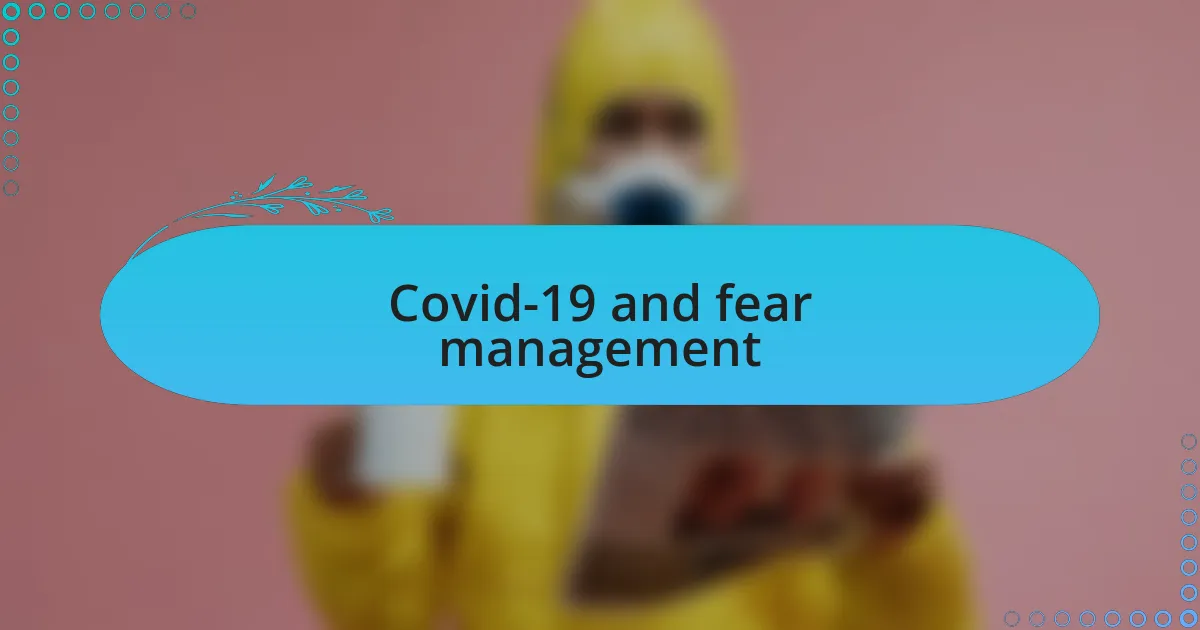
Covid-19 and fear management
Covid-19 transformed fear into a constant companion for many of us. I recall waking up each day feeling anxious about whether my loved ones would stay safe or if I might unknowingly spread the virus. These fears were often overwhelming, leading me to avoid social situations entirely, which only compounded my sense of isolation.
In managing the ongoing fear during the pandemic, I found that staying informed helped me regain some control. Engaging with credible sources allowed me to separate fact from fiction, which eased my anxiety significantly. How do you manage the flood of information? I often took breaks from the news, realizing that constant exposure to grim statistics and dire warnings was only feeding my fear.
Implementing mindfulness practices was another strategy that truly fit my needs. Those moments spent focusing on my breath or taking walks outside suddenly became essential. In those quiet times, I learned that while fear was a deeply ingrained response to this crisis, it didn’t have to dictate my life. Does nurturing your mental space sound appealing? To me, it became a lifeline that helped me navigate through the uncertainty of Covid-19.
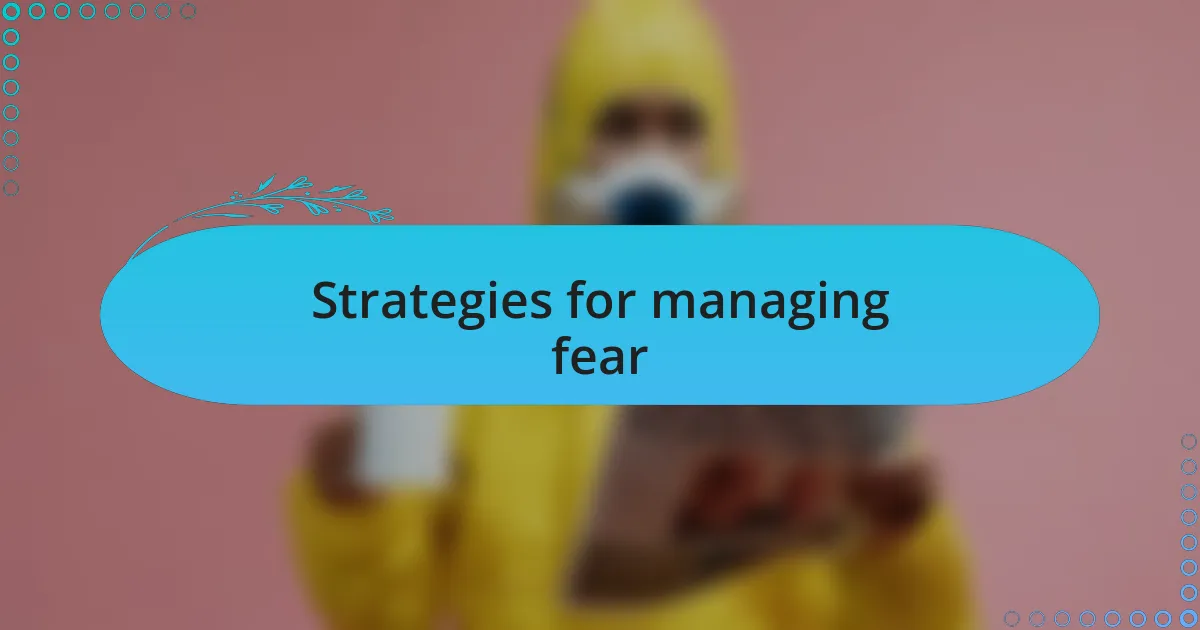
Strategies for managing fear
Finding effective strategies for managing fear during such uncertain times is crucial. One thing that worked well for me was creating a structured daily routine. I began reserving specific time slots for exercise, work, and relaxation. This structure not only kept my mind focused but also allowed me moments to look forward to, reducing the anxiety of the unknown.
I also leaned heavily on connection with others as a strategy. I initiated regular video calls with friends and family, transforming a daunting sense of isolation into shared experiences. There’s something comforting about discussing fears together, right? Those conversations became our safe spaces, reminding me that I wasn’t alone in this each step of the way.
Lastly, I found journaling to be a powerful tool. Penning down my thoughts helped me articulate my fears rather than letting them swirl around unchecked in my mind. It was a cathartic experience, allowing me to reflect on what triggered my anxiety and how I might tackle it. Have you thought about writing your fears down? You might just be surprised at how liberating it feels to see your thoughts on paper and gain a new perspective on them.
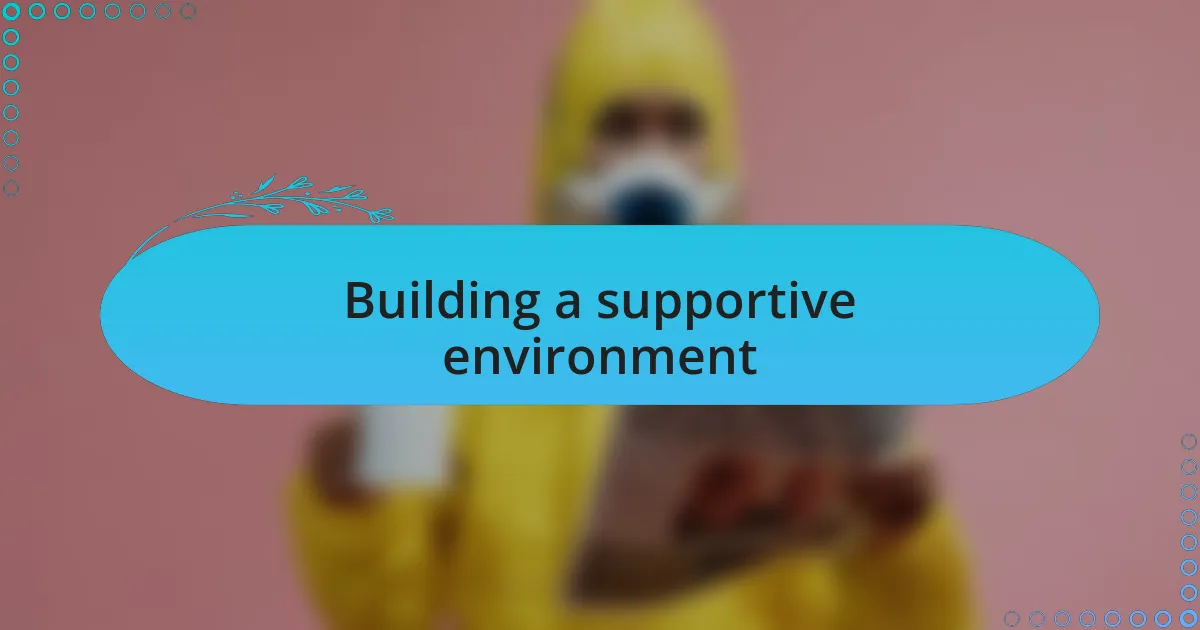
Building a supportive environment
Creating a supportive environment starts with choosing the right people to surround yourself with. I remember reaching out to my neighbors during lockdown and forming a small support group. We shared resources, swapped recipes, and even added excitement to our week by organizing movie nights via video chat. It was incredible how these connections turned my fear of isolation into something much more manageable.
Another aspect is how physical space influences emotional well-being. I made it a point to keep my living space positive and inviting. I added plants and photos that lifted my spirits and even made a cozy reading nook. Have you ever noticed how a simple change in your surroundings can impact your mood? For me, personalizing my space made a significant difference in feeling safe and supported, even during tough times.
Moreover, we should not underestimate the power of open communication. I started conversations with friends about my fears and anxieties, which fostered a more profound sense of understanding and trust. By sharing my vulnerabilities, I found that many felt the same way. It makes you wonder—could sharing fears together create stronger bonds? From my experience, it surely does, bringing a sense of relief that we are all navigating this journey together.
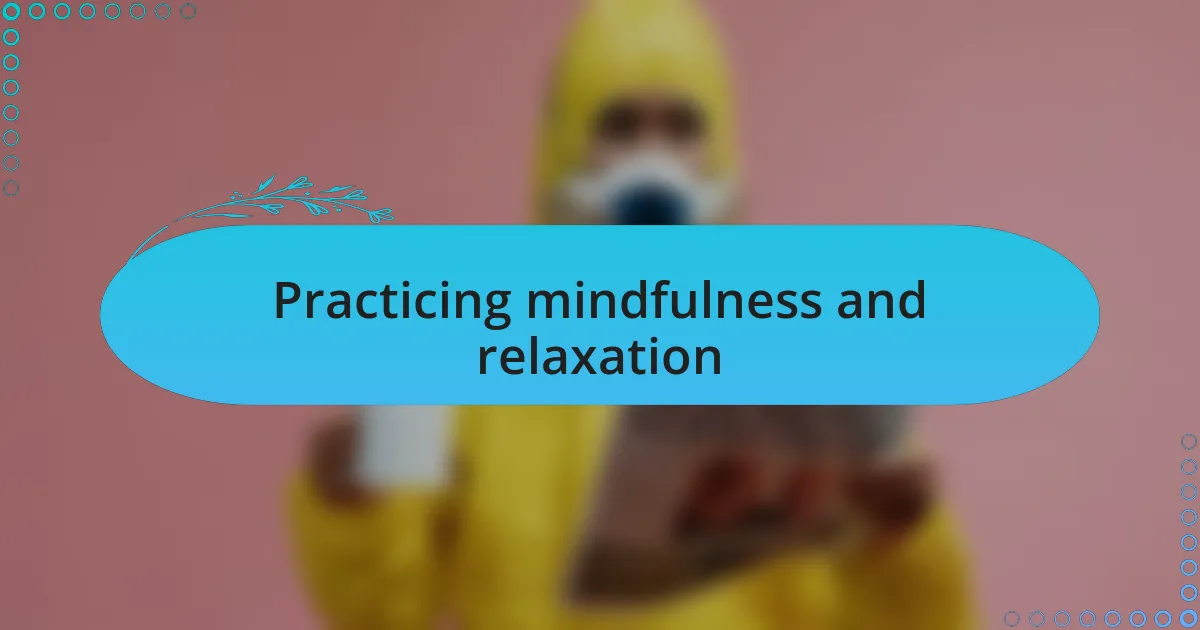
Practicing mindfulness and relaxation
Practicing mindfulness has been a game-changer for me, especially during stressful times like the pandemic. I found that dedicating even five minutes a day to focus on my breath while sitting quietly on my balcony helped ground me. It made a noticeable difference in my anxiety levels—have you ever tried just being present in the moment? It truly allows you to step back and gain perspective.
Incorporating relaxation techniques into my routine has helped me navigate fear more effectively. For instance, I started doing guided meditation before bed, which not only eased my mind but also improved my sleep quality. I can’t tell you how refreshing it is to wake up feeling more rested and less anxious. Have you noticed how a calm mind can profoundly affect your day-to-day life?
Moreover, I find that engaging in gentle stretching or yoga can be a beautiful way to connect with my body and release pent-up tension. Just recently, I rolled out my mat and followed an online class, and by the end, I felt a wave of relief wash over me. Isn’t it fascinating how physical movements can help align our mental state? These practices have rooted me in the present, transforming my relationship with fear from one of struggle to one of acceptance.
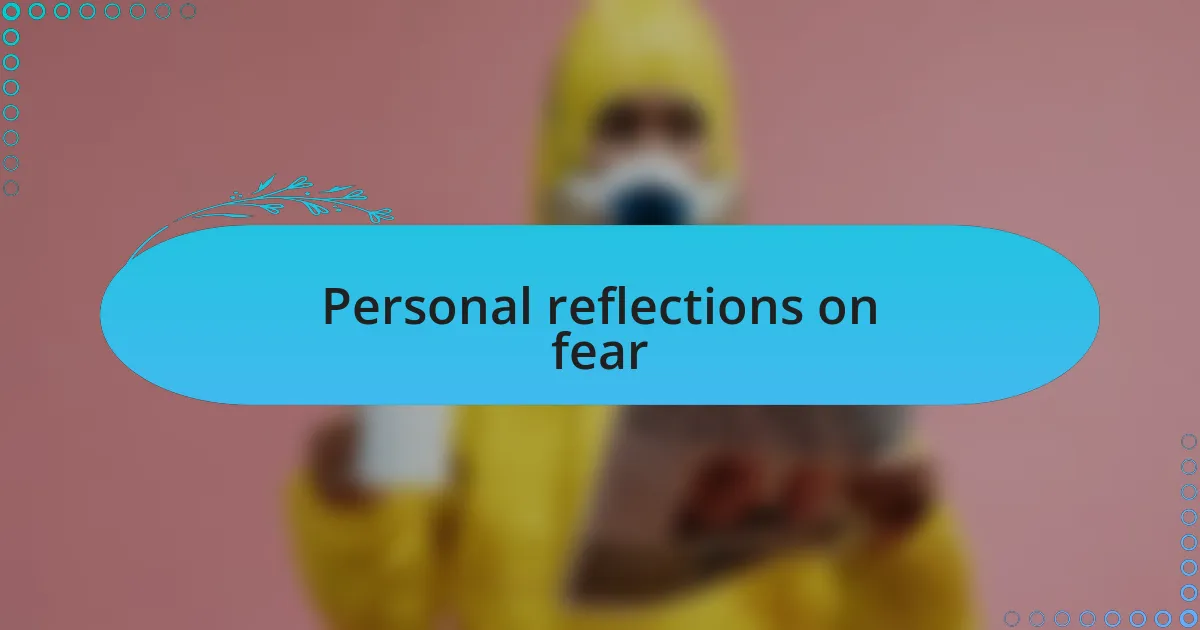
Personal reflections on fear
Fear has been an ever-present companion in my life, especially amidst the uncertainty of the pandemic. I vividly remember moments when my thoughts spiraled toward worst-case scenarios, causing my heart to race. It often left me wondering: how can I regain control when everything feels so unpredictable? Acknowledging those feelings has been my first step—realizing that fear doesn’t have to dictate my actions.
Looking back, I recall nights where I lay awake, consumed by worry about the future. It was during one of those restless nights that I stumbled upon journaling as an outlet. Pouring my fears onto the page helped me process my emotions and even led to surprising realizations about the resilience I possessed. Have you ever tried writing down what scares you? I found that putting pen to paper illuminated the path to understanding and confronting those fears head-on.
In those quiet moments of reflection, I discovered the importance of vulnerability. I’ve come to understand that sharing my fears with friends can diminish their power, transforming what felt isolating into a shared experience. Have you ever felt lighter after talking about your worries? Opening up showed me that I am not alone in this journey, establishing a sense of connection that helped me navigate fear with greater ease.

Sharing experiences and insights
When I finally started sharing my fears with others, it felt like lifting a weight off my shoulders. One day, I gathered a few close friends for a casual dinner, and we ended up discussing our anxieties about health and the future. It surprised me how many of us were grappling with similar thoughts—just like that, I felt a sense of camaraderie that reminded me I was not alone in this struggle.
There was a moment when I joined an online support group, thinking it might be a bit intimidating. Instead, it turned into a rich tapestry of shared experiences, where each story echoed my own fears and triumphs. Have you ever found solace in the narratives of strangers? Hearing how others coped with their fears not only inspired me but also gave me fresh perspectives on managing my own anxiety.
Each time I share my journey, I notice others opening up in return, creating a safe space for vulnerability. One of my friends confessed her fear of going back into crowded places, and in that exchange, we crafted a mutual plan to do it together—one small step at a time. Isn’t it fascinating how a simple conversation can turn into a powerful tool for healing and growth? It reminds me that connection is key in managing fear and finding the courage to face uncertain times.